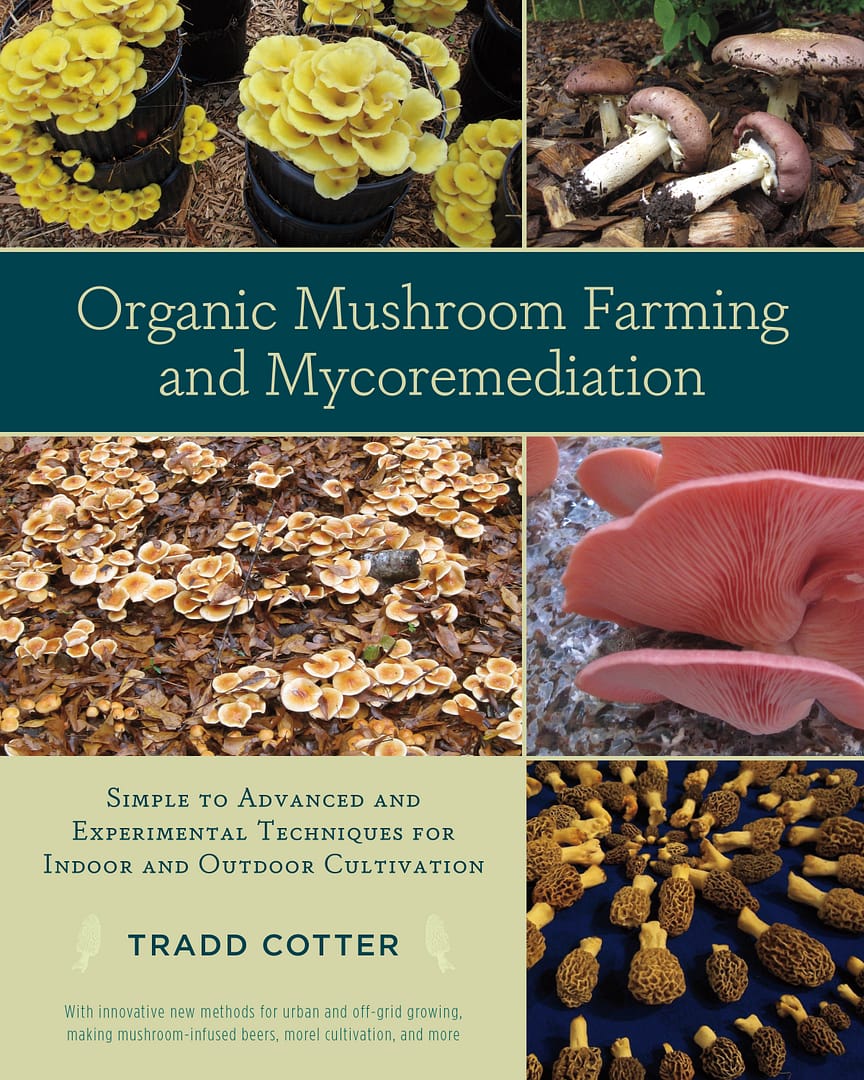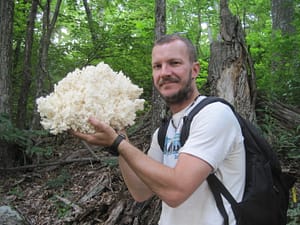Organic Mushroom Farming and Mycoremediation
Simple to Advanced and Experimental Techniques for Indoor and Outdoor Cultivation

| Pages: | 400 pages |
| Book Art: | Color photos and illustrations throughout |
| Size: | 8 x 10 inch |
| Publisher: | Chelsea Green Publishing |
| Pub. Date: | August 18, 2014 |
| ISBN: | 9781603584555 |
Organic Mushroom Farming and Mycoremediation
Simple to Advanced and Experimental Techniques for Indoor and Outdoor Cultivation
Paperback
$39.95
An in-depth exploration of organic mushroom cultivation practices, groundbreaking research and myriad ways to incorporate mushrooms into your life
“A clear, comprehensive guide that is a gift to amateur as well as professional mushroom growers. This book opens the doors wide to a diverse and fascinating fungal world.”—Toby Hemenway, author of Gaia’s Garden
What would it take to grow mushrooms in space? How can mushroom cultivation help us manage, or at least make use of, invasive species such as kudzu and water hyacinth and thereby reduce dependence on herbicides? Is it possible to develop a low-cost and easy-to-implement mushroom-growing kit that would provide high-quality edible protein and bioremediation in the wake of a natural disaster? How can we advance our understanding of morel cultivation so that growers stand a better chance of success?
For more than twenty years, mycology expert Tradd Cotter has been pondering these questions and conducting trials in search of the answers. In Organic Mushroom Farming and Mycoremediation, Cotter not only offers readers an in-depth exploration of best organic mushroom cultivation practices; he shares the results of his groundbreaking research and offers myriad ways to apply your cultivation skills and further incorporate mushrooms into your life―whether your goal is to help your community clean up industrial pollution or simply to settle down at the end of the day with a cold Reishi-infused homebrew ale.
Inside, you’ll find:
- The Fundamentals of Mushroom Cultivation
- Innovative Applications and Projects Using Fungi
- Basic Laboratory Construction, Equipment, and Procedures
- Starting Cultures and Spawn Generation
- Detailed descriptions of over 25 different genus
The book first guides readers through an in-depth exploration of indoor and outdoor cultivation. Covered skills range from integrating wood-chip beds spawned with king stropharia into your garden and building a “trenched raft” of hardwood logs plugged with shiitake spawn to producing oysters indoors on spent coffee grounds in a 4×4 space or on pasteurized sawdust in vertical plastic columns. For those who aspire to the self-sufficiency gained by generating and expanding spawn rather than purchasing it, Cotter offers in-depth coverage of lab techniques, including low-cost alternatives that make use of existing infrastructure and materials.
Cotter also reports his groundbreaking research cultivating morels both indoors and out, “training” mycelium to respond to specific contaminants, and perpetuating spawn on cardboard without the use of electricity. Readers will discover information on making tinctures, powders, and mushroom-infused honey; making an antibacterial mushroom cutting board; and growing mushrooms on your old denim jeans.
Geared toward readers who want to grow mushrooms without the use of pesticides, Cotter takes “organic” one step further by introducing an entirely new way of thinking―one that looks at the potential to grow mushrooms on just about anything, just about anywhere, and by anyone.
“This comprehensive introduction to growing and utilizing fungi has something for all mushroom-inclined readers . . . . Both practical and passionate, Cotter offers extensive and detailed information.”—Publishers Weekly
Reviews and Praise
Library Journal-
"Microbiologist Cotter came to mushroom farming in his 20s and quickly became hooked. He shares his enthusiasm for the practice in this wide-ranging book, which covers topics of interest for the beginning hobbyist to the market farmer. Starting with general information about the mushroom life cycle and growing techniques, it progresses into innovative applications for mushrooms and educational ideas using fungi, and then gets into advanced systems. The title concludes with a guide to specific mushrooms and methods for growing them indoors and outdoors. Highlights of innovative techniques include growing media and guerilla urban mushroom producing. More advanced and experimental projects are fascinating, such as the potential for mushroom farming on a space ship and advice on ways to cultivate morels. Emphasized throughout are low-cost and sustainable methods, with several features on how to grow mushrooms without electricity and in disaster areas. Cotter describes the “mushroom rescue modules” he imagines being shipped to disaster relief areas that can provide food, mosquito control, and water purification. VERDICT Because this title covers a lot of ground it will be extremely useful for mushroom farming enthusiasts at any level.”
More Reviews and Praise
Booklist-
"Mushrooms 'are part of Nature’s decomposers and constructors, the agent of habitat renewal,' Cotter tells us. And mycoremediation is the use of mushrooms to create an effective biomass that can break down environmental and industrial pollutants. A microbiologist, mycologist, and organic gardener, Cotter takes a holistic approach, mindful of the mushroom’s life cycle and ecological role, in this challenging guide to the indoor and outdoor cultivation of edible mushroom varieties. He also provides information on medicinal, industrial, and ecologically remedial applications. His in-depth exploration extends beyond cultivation to 'healing the people and the planet.' The book’s four sections cover the fundamentals of mushroom cultivation; innovative applications and projects, including alcoholic beverages; advanced techniques and research, including mycoremediation; and detailed descriptions of selected mushrooms. With plenty of photographs and other illustrations and comprehensive back matter, including glossary, bibliography, list of resources and suppliers, and index, Cotter’s advanced how-to is best for those seeking serious mycological knowledge.”
Publishers Weekly-
"This comprehensive introduction to growing and utilizing fungi has something for all mushroom-inclined readers, be they individuals curious about growing edible fungi in their backyards or basements, prospective mushroom farmers setting up large growing systems, educators from kindergarten to college levels, or innovators experimenting with eco-friendly materials. In addition to providing step-by-step directions for growing mushrooms, the book foodies, amateur scientists, and activists with esoteric and advanced applications for them, such as mushroom-infused beers; 'mushroom modules' that can be used for food, water filtration, or insect control in disaster relief; and mushrooms that can be “trained” to break down specific contaminants. Both practical and passionate, Cotter offers extensive and detailed information about mushroom biology, propagation, and remediation for novices. This refreshing take goes beyond typical how-tos, which only provide rote directions and absolute answers. He has equal interest in encouraging budding mycologists, mushroom growers, and mycoremediators to observe, experiment, and add to the knowledge of this mysterious burgeoning field.”
“Organic Mushroom Farming and Mycoremediation is a guide and inspiration for new and experienced mushroom cultivators alike. Tradd Cotter has done a great job of combining the complexity of mushroom cultivation with the intuitive simplicity of ‘small steps.’ Highly recommended for fungophiles as a great read and reference!” --Jim Gibson, past president, Colorado Mycological Society
“Tradd Cotter has written a clear, comprehensive guide that is a gift to amateur as well as professional mushroom growers. The pages are enlivened by Cotter’s enthusiasm for the many possibilities that fungi offer, and his obvious familiarity with growing these marvelous creatures—not just theoretical knowledge—makes the book particularly valuable. This book opens the doors wide to a diverse and fascinating fungal world.”--Toby Hemenway, author of Gaia’s Garden: A Guide to Home-Scale Permaculture
“Mushroom cultivation should be playing a much bigger role in our gardens and farms. Tradd Cotter’s Organic Mushroom Farming and Mycoremediation provides low-cost, easily accessible techniques for growing mushrooms indoors and outdoors, from home to commercial scale.”--Eric Toensmeier, author of Paradise Lot and Perennial Vegetables
“This is a reference book for the next generation of DIY mycologists. It is a great practical guide to mushroom cultivation, starting with basic concepts and building from there to mycoremediation and experimental strain development. Tradd Cotter is a man with a mission, who has done and thought about all this a lot; he has learned to explain it with great clarity and in a simple and well-organized manner.”--Sandor Ellix Katz, fermentation revivalist and author of The Art of Fermentation and Wild Fermentation
“Finally, an accessible resource covering a wide variety of mushroom-cultivation approaches. Tradd Cotter’s book fills an enormous need—I’ve been wishing for a resource like this for a long time. This is the kind of book I’ll keep nearby and will turn to often over the years. Any farmer or gardener who wishes to garner food or medicine value from wood needs to understand and cultivate mushrooms. And this is the best all-around manual I’ve seen.”--Ben Falk, author of The Resilient Farm and Homestead
“Tradd Cotter has done a wonderful job sharing his practical experience in a well-organized way with illustrations that clearly underline the topics. Organic Mushroom Farming and Mycoremediation is an invaluable resource for teaching students about mushroom cultivation.”--Peter Oei, author of Mushroom Cultivation, director of horticulture innovation at InnovatieNetwerk, Dutch Ministry of Economic Affairs, and founder of MeattheMushroom.nl and spore.nl.
“Wow! Tradd Cotter is a genius of organic mushroom production. His step-by-step instructions and beautiful photography make this a must-have book.”--Robert Rogers, author of The Fungal Pharmacy: The Complete Guide to Medicinal Mushrooms and Lichens of North America






